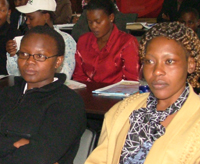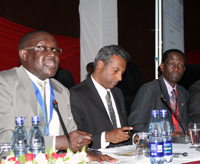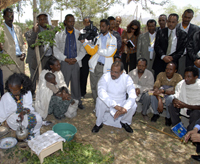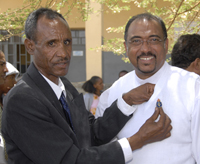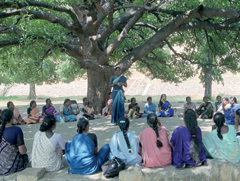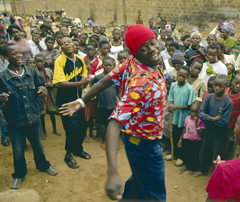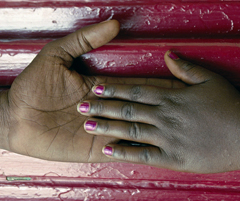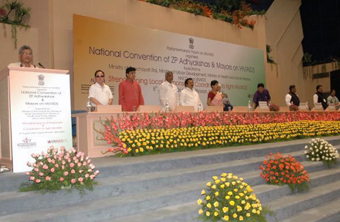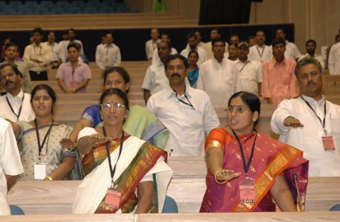When young housewife and mother Kiri* learned she and her young son had tested positive for HIV, she didn’t know where to turn. “I had so many problems hidden in my heart. I didn’t dare tell my problems to anyone. Keeping this secret from people made me so distressed that sometimes I wanted to kill myself to escape from this suffering,” she said.
But Kiri found strength and support by picking up the telephone. She dialled the special ‘Inthanou’ (the Khmer word for ‘Rainbow’) hotline – a unique free, anonymous and confidential telephone counselling service established by a local NGO in 2000 to provide vital HIV information, support, counselling and referral – and help was at hand.
“After contacting the Inthanou hotline, I felt relieved and much less distressed after discussing my long-hidden problems. Now I can express my feelings to someone without any fear because: Firstly: No one knows who I am. Secondly: The conversation is confidential. Thirdly: I can discuss issues concerning my personal health problems and receive good advice and encouragement,” she explained.
Kiri is one of many benefiting from the Inthanou hotline. Since its creation in August 2000, the initiative has reached almost 300,000 people, most of them aged between 15 and 24.
The hotline is the result of a partnership with a telephone company in Cambodia, which provides two free telephone lines that are available in all of the county’s provinces. Funded by UNAIDS Cosponsor organization UNICEF, the French Embassy and other donors, the hotline runs six days a week from 11:00 to 20:00 and receives an average of 200 calls per day. In 2005 the hotline received a total of 63,228 calls.
Inthanou employs nine trained counsellors who provide information on HIV and reproductive health and when necessary refer callers to Voluntary Counselling and Testing Centres, as well as other medical services including Sexually Transmitted Infection clinics, access to treatment and care, and networks of people living with AIDS for psychosocial support.
“The hotline is not only providing information but it is also referring services that are available in the country. In this way the hotline is making a real impact on people’s lives, and is making a difference,” said Fabrice Laurentin, Project Officer for UNICEF Cambodia.
For Kiri, referrals from the hotline have led to her being able to access antiretroviral treatment from a local NGO. For others, the hotline has had equally positive impacts such as referrals which have lead to people living with HIV being able to access small grant funding to set up businesses.
The hotline is regularly promoted through various media, particularly TV and radio as well as via advertisements in magazines, t-shirts, key-rings and pamphlets that are widely distributed. In 2004 a special poster campaign was conducted featuring some of the country’s top sporting stars. In August 2006, the National AIDS Authority and UNICEF launched another special poster campaign promoting greater awareness of HIV among young women and encouraging them to use the free Inthanou HIV hotline.
“I really hope that this campaign will reduce women’s shyness about AIDS-related issues and encourage them to call the hotline,” said Dr. Loun Monyl, Inthanou Coordinator.
Inthanou also has a web site (www.inthanou.org) which provides online information on HIV and prevention and treatment services, as well as useful advice and testimonies of people living with HIV and other members of the public who have accessed the hotline for more information and assistance.
One young man tells his story on the web site: “I have had sex with my closest friend and I rarely thought about using condoms. I believed that having sex with a man was safe,” he explained.
One day as he was reading a magazine he came across Inthanou’s hotline number, advertising that the hotline provides anonymous and confidential information related to HIV and STDs. He called the hotline and counsellors advised him that having unprotected sex with a male partner, is a high risk behaviour for transmission of HIV and STDs. The counsellor gave him helpful advice about how to reduce the risk of HIV infection. Having consulted the hotline, he acknowledges that the hotline counsellor gave him important information about HIV. “I am now interested in finding out more about issues related to health and HIV. I often call Inthanou counsellors when I have questions,” he said.
“Ithanou is reaching out to all sectors of the population. Its anonymous and confidential service makes it easier for people to start talking about issues that are often taboo. In this way it is encouraging dialogue on issues of HIV and STIs and is helping break down stigma and discrimination,” said Jane Batte, Social Mobilization and Partnerships Advisor, UNAIDS Cambodia.
"You can protecty yourself against HIV, use condoms... If you want to know more about HIV and AIDS, please call 012 999 008/012 999 009" - Poster from the 2004 campaign uses famous Cambodian boxing star to raise awareness.
The hotline aims to build on its current service and, with additional funding, hopes to continue to answer tens of thousands of calls and refer at least 12,000 callers to appropriate government and NGOs medical and non-medical facilities every year.
“We want to reach out and make a difference to as many people as possible. With Inthanou, help is just a phone call away,” said hotline Coordinator Dr Monyl.
According to the UNAIDS Global Report 2006, at 1.6%, adult national HIV prevalence in Cambodia was one-third lower in 2005 than in the late 1990s—due mainly to a combination of rising mortality rates and HIV prevention efforts that helped reduce unprotected paid sex. However, the country is still burdened with one of the worst epidemics in Asia with women constituting a growing share of people living with HIV – an estimated 47% in 2003, compared with 37% in 1998.
*names have been changed to protect identity
Testimonials used in this story appeared first on the Inthanou web site – http://www.inthanou.org
Related links
http://www.inthanou.org
http://www.unicef.org
|
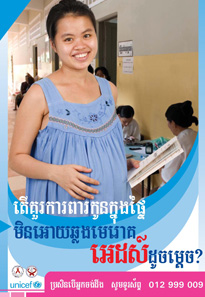
|
"Do you know how to protect your baby from HIV? If you want to know call 012 999 009"
Poster from the 2006 UNICEF / National AIDS Authority poster campaign targets pregnant women.
|
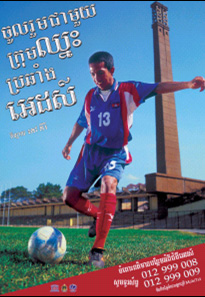 |
"Be part of the winning team against HIV/AIDS... If you want more information about HIV/AIDS, please call 012 999 009/012 999 008"
Poster from the 2004 campaign uses a famous Cambodian football player to raise awareness. |
 |
"Someone with HIV can swim with me...If you want to know more about HIV and AIDS, please call 012 999 008/012 999 009"
Poster from the 2004 campaign uses a famous Cambodian swimmer to raise awareness. |
|
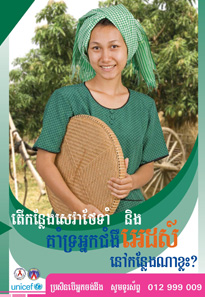
|
“Where to access care and support related to HIV and AIDS? If you want to know, please call 012 999 009”
Poster from the 2006 UNICEF / National AIDS Authority poster campaign targets farm worker
|
 |
"Run faster than AIDS, use condoms... If you want more information about HIV/AIDS, please call 012 999 009/012 999 008"
Poster from the 2004 campaign uses a famous Cambodian runner to raise awareness. |
 |
“Where to do an HIV test? If you want to know, call 012 999 009”
Poster from the 2006 UNICEF / National AIDS Authority poster campaign targets female workers |




